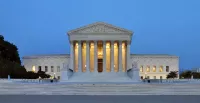Curtis Giovanni Flowers is an American who was tried six times for the same 1996 quadruple homicide in Winona, Mississippi. Four of the six trials resulted in convictions and death sentences, all of which were overturned on appeal due to prosecutorial misconduct, particularly by District Attorney Doug Evans, who struck Black jurors at a disproportionately higher rate than white jurors. Flowers spent over 20 years on death row at Parchman prison before his release in December 2019 after the U.S. Supreme Court vacated his latest conviction in 2019, citing racial bias in jury selection. In 2020, the charges against Flowers were dropped after he had spent nearly 23 years in prison.
May 29, 1970: Birth of Curtis Flowers
Curtis Giovanni Flowers was born on May 29, 1970.
1986: Batson v. Kentucky
The 1986 Batson v. Kentucky case established that peremptory challenges cannot be used to discriminate against jurors based on race. This precedent was key in overturning Flowers' third conviction.
July 16, 1996: Tardy Furniture store shooting
On July 16, 1996, four people were shot and killed inside the Tardy Furniture store in Winona, Mississippi. Curtis Flowers was later accused of these murders.
1996: Tardy Furniture Murders
The murders at Tardy Furniture store, for which Curtis Flowers was tried six times, occurred in 1996.
1997: First Trial
Curtis Flowers' first trial took place in 1997.
1997: Conviction and Sentencing
In 1997, Curtis Flowers was convicted by an all-white jury and sentenced to death.
September 1998: Change of Venue Granted
In September 1998, a change of venue was granted for Flowers' second trial, moving it to Harrison County.
March 22, 1999: Second Trial Begins
Flowers' second trial, for the murder of Derrick Stewart, began on March 22, 1999.
1999: Second Trial
Curtis Flowers' second trial took place in 1999.
2000: First Conviction Overturned
In 2000, the Mississippi Supreme Court overturned Flowers' first conviction due to prejudicial evidence and prosecutorial misconduct.
2003: Second Conviction Overturned
Flowers' second conviction was overturned in 2003 due to prosecutorial misconduct.
February 12, 2004: Third Trial and Conviction
Flowers' third trial concluded on February 12, 2004, resulting in his conviction on four counts of murder.
2004: Third Trial
Curtis Flowers' third trial took place in 2004.
2007: Fourth Trial
Curtis Flowers' fourth trial took place in 2007, resulting in a hung jury.
2007: Third Conviction Overturned
Flowers' third conviction was overturned in 2007 due to racially motivated jury selection.
2007: Fourth Trial and Mistrial
In 2007, Curtis Flowers' fourth trial for murder resulted in a mistrial due to a hung jury, split 7-5 in favor of conviction. The prosecution did not seek the death penalty at the victims' families' request. The jury's racial makeup was noted, with five African Americans on the jury and a reported divide in votes along racial lines.
2008: Fifth Trial and Mistrial, Accusations of Perjury
Curtis Flowers' fifth trial in 2008, where the prosecution sought the death penalty, also ended in a mistrial. An alternate juror, the only black woman on the jury, was arrested for perjury. Following the trial, the judge accused the sole juror opposed to conviction, who was African American, of perjury, although the charges were later dropped.
2008: Fifth Trial
Curtis Flowers' fifth trial took place in 2008, also resulting in a hung jury.
June 10, 2010: Sixth Trial, Conviction, and Death Sentence
On June 10, 2010, Curtis Flowers' sixth trial began with a jury composed of eleven white and one black juror. After brief deliberations, the jury found Flowers guilty and sentenced him to death.
June 18, 2010: Sixth Trial and Conviction
On June 18, 2010, a majority-white jury convicted Curtis Flowers for the sixth time in the 1996 Tardy Furniture store murders. He was sentenced to death.
2010: Sixth Trial
Curtis Flowers' sixth trial took place in 2010, resulting in a conviction.
2014: Mississippi Supreme Court Upholds Conviction
In 2014, the Mississippi Supreme Court upheld Curtis Flowers' conviction and death sentence from his sixth trial.
June 2016: Supreme Court Remands Case
In June 2016, the U.S. Supreme Court remanded Curtis Flowers' case to lower courts for review of potential racial bias in jury selection.
2016: Case Review
In 2016, the U.S. Supreme Court referred Flowers' case back to the Mississippi Supreme Court for review.
November 2017: Mississippi Supreme Court Reaffirms Conviction
In November 2017, the Mississippi Supreme Court reaffirmed its prior decision, upholding Flowers' conviction and death sentence.
November 2, 2018: Supreme Court Grants Certiorari
On November 2, 2018, the U.S. Supreme Court granted certiorari to review the Mississippi Supreme Court's application of Batson v. Kentucky in Flowers' case.
2018: "In the Dark" Podcast
In 2018, the podcast "In the Dark" featured the Curtis Flowers case.
2018: "In the Dark" Podcast Investigates
In 2018, the podcast "In the Dark" released a season investigating the Flowers case, raising doubts about the case's legitimacy, including witness perjury, prosecutorial misconduct, and missing evidence.
March 20, 2019: Supreme Court Hears Oral Arguments
On March 20, 2019, the U.S. Supreme Court heard oral arguments in Flowers v. Mississippi.
June 2019: Supreme Court Overturns Conviction
In June 2019, the U.S. Supreme Court overturned Curtis Flowers' murder convictions.
June 21, 2019: Supreme Court Overturns Conviction
On June 21, 2019, the U.S. Supreme Court overturned Flowers' conviction, citing a Batson violation by the prosecutor in jury selection.
December 2019: Release from Prison
In December 2019, Curtis Flowers was released from prison on bond after over 20 years of incarceration.
December 16, 2019: Flowers Granted Bail
On December 16, 2019, Curtis Flowers was granted bail and released with restrictions, after the judge noted recanted witness testimonies and potentially exculpatory evidence.
2019: Conviction Overturned
In 2019, the U.S. Supreme Court overturned Flowers' conviction.
January 2020: Prosecutor Recuses Himself, Charges Dropped
In January 2020, the prosecutor recused himself from the Flowers case. Later, in September 2020, all charges against Flowers were officially dropped, with the Attorney General citing lack of credible witnesses and new evidence.
September 4, 2020: Charges Dropped
On September 4, 2020, Mississippi Attorney General Lynn Fitch announced that all charges against Curtis Flowers would be dropped, marking the end of his legal battles.
2020: Charges Dropped
In 2020, all charges against Flowers were dropped.
2021: Compensation Awarded
Curtis Flowers was awarded $500,000 in 2021 as compensation for wrongful incarceration.
Mentioned in this timeline
Kentucky officially the Commonwealth of Kentucky is a state located...

A supreme court or court of last resort is the...
Mississippi is a state in the Southeastern and Deep South...

September is the ninth month of the year in the...
Trending
16 minutes ago Saddiq Bey Proves Pelicans Right After Trade: Flipping the Narrative Brilliantly

10 days ago Newsom supports age restrictions on social media citing parental experience and teen phone obsession.

11 months ago Mark Williams' Status Uncertain for Friday's Game; Will Rest on Sunday.
17 minutes ago Kirill Kaprizov aims for Wild's goal record after scoring against St. Louis.

18 minutes ago Michael Strahan's Lifestyle Brand Expands with Belk Partnership and Career Announcement.

18 minutes ago Maggie and Jake Gyllenhaal's Bond: Closer Than Ever, Reflecting on Careers and Relationships.
Popular

Hillary Diane Rodham Clinton is a prominent American politician lawyer...

Jesse Jackson is an American civil rights activist politician and...

Ken Paxton is an American politician and lawyer serving as...

Jim Carrey is a Canadian-American actor and comedian celebrated for...

Bill Clinton served as the nd U S President from...

XXXTentacion born Jahseh Dwayne Ricardo Onfroy was a controversial yet...
